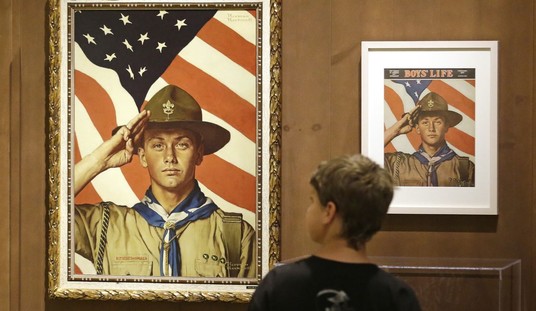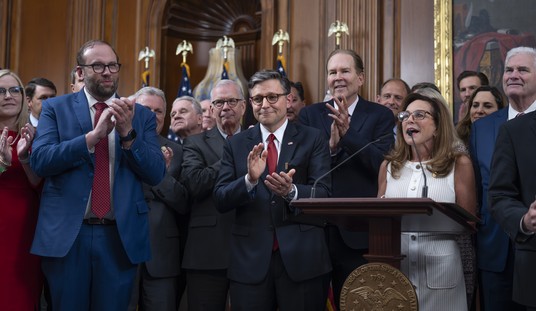Calm down. The end hasn’t come yet, not quite. But you can feel it coming, a dull, oppressive presence like the heaviness of the air before a storm, or the quickly widening fissures that consumed the House of Usher. Future historians, looking back on the wreck of the Obama administration, will mark with wonder the president’s darkly frivolous assertion of executive privilege this week. It was then, they will say, that his administration, that the president himself, officially entered the Period of Panic and Flailing.
It’s not going to be pretty. Expect a season of recriminations, grandiosities, and sudden reversals. The usual narrative holds that Obama asserted executive privilege, denying Congress the documents it requested in the murderous case of gunwalking called “Fast and Furious” in order to save his Attorney General Eric Holder. Perhaps. I wouldn’t be at all surprised if, at the end of the day, this spectacular piece of recklessness wasn’t regarded as the beginning of the end for Eric Holder, who will likely face a Contempt of Congress citation next week. Already, various outlets are preparing the ground by quietly inserting into the discussion the name of Alberto Gonzales, the attorney general under President George W. Bush who was hounded out of office by Democratic zealots after he fired some U.S. attorneys. The idea, I suspect, is to upholster the ground so that when (as I predict) Holder is forced out Obama cheerleaders like the New York Times can resort to the tu quoque strategy: “Well, Bush’s attorney general had to resign, too, and some of his staffers were held in contempt.”
Will the upholstery work? Will it successfully insulate public opinion from the damaging facts of the case? I doubt it. For one thing, the two incidents are screamingly different. As usual, Andy McCarthy outlined the issue with superlative clarity:
[T]he Bush situation involved (a) a non-crime (presidents do not need a reason to fire U.S. attorneys), (b) a non-scandal manufactured into a scandal (Bush 43 fired 8 U.S. attorneys; Clinton had fired 92 of the 93, and for no better reason than partisan patronage after he defeated Bush 41), and (c) patently improper subpoenas to the president’s personal staffers who are not subject to Senate confirmation and assist him in his constitutional duties. The Obama/Holder situation, to the contrary, involves outrageous government malfeasance in firearms transfers that led to murders, including the killing of a federal agent, and a patently proper subpoena for documentation maintained by the Justice Department, an agency created by Congress and dependent on Congress for its existence, funding and jurisdiction.
We need to keep those differences in mind as the story unfolds. We also need to remind ourselves of how blatantly, er, economical Eric Holder has been with the truth as he testified under oath before Congress. He didn’t know about Fast and Furious, no sirree, until the day before yesterday, except that internal Justice Department documents show he knew about it back in July of 2010. An email discussing “Fast and Furious” was really about an operation called “Wide Receiver” and was overseen by George W. Bush’s Attorney General Michael Mukasey, except that it wasn’t, as Holder eventually acknowledged (without, however, apologizing to Mr. Mukasey). The more we know about Fast and Furious, the more it appears that Holder’s testimony before Congress is a tissue of evasions, equivocations, and outright lies.
For ordinary folk, lying under oath is a serious offense. What does it portend for above-the-law elites like Eric Holder? At the very least, I suspect, it means that he should be polishing his resume. And here’s something else to ponder: as I say, Obama’s assertion of executive privilege has been widely interpreted as an effort to protect Holder. Yet I can’t help thinking that behind that spectacular performance I hear the revving of a bus engine, a bus that has Eric Holder’s name on it and that he is shortly to be thrown under. Sure, the president wants to conceal something by asserting executive privilege. The dramatic and politically risky nature of the act naturally leads one to suspect that it is something serious. You can’t hear the phrase “executive privilege” without thinking “Watergate,” a word you can’t hear without thinking “cover-up,” “Nixon,” “impeachment.” In fact, Fast and Furious is far worse than Watergate. No one died in Watergate. Dozens of people are dead as the result of Fast and Furious, including at least one U.S. citizen, Border Agent Brian Terry.
No, Obama’s assertion of executive privilege will do little if anything to save Eric Holder. Its chief effect, I predict, will be to focus attention more sharply on the great questions that have not been sufficiently plumbed: Who is Barack Obama? What does he have to hide?









Join the conversation as a VIP Member